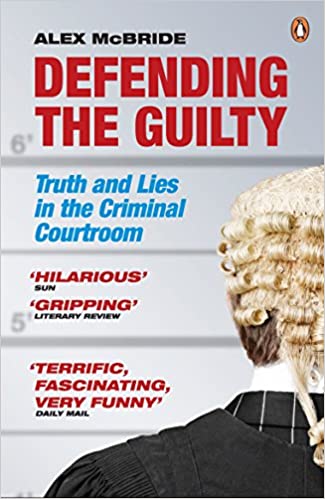Truth and Lies in the Criminal Courtroom
Alex McBride
Penguin Books, 2011.

This is an entertaining read. Alex McBride tells us about starting out as a barrister defending and prosecuting criminal cases. He includes stories of the cases, meeting the clients in the cells, what went wrong in court, and how he felt.
He sprinkles in some background history of legal principles, but not too much to bore the general reader.
The often chaotic life of a junior barrister is told, including receiving cases at the last minute with little time to prepare.
Alex has an entertaining style of writing and a fun turn of phrase. For example, when describing how, four months into a trial that Alex was prosecuting, the Judge stopped the trial for legal reasons and dismissed the case:
“We in the prosecution might have been feeling hard done by, but it was nothing compared with the jurors. They had got the worst deal. They’d sat through four months of evidence and the only decision they’d been allowed to make was how many sugars to have in their tea.” Page 156.
He describes a conscience pricking moment defending his client charged with Grievous Bodily Harm (GBH) ‘with intent’ for breaking a young man’s jaw. Just prior to the trial, Alex sought a deal with Crown Prosecution Service (CPS), whereby in order to avoid a trial, his client was willing to plead guilty to a lesser charge of GBH ‘without intent’. The prosecutor refused the deal, and the trial went ahead. Alex’s job in defending was therefore to seek to persuade the jury that the assault was not ‘with intent’. To do that required pulling apart the testimony of the young victim, Horace:
“I went through the two versions of Horace’s evidence picking out each lie and inconsistency. It’s a slow process establishing the points that you wish to make through one short statement, phrased as a question, after another. For the witness the experience is a vile one. Horace weathered the questions badly. The details of his story kept changing…After a while he stopped answering, failing even to deny my accusations that he was a liar.
From time to time during my cross-examination I glanced at his mother, watching me from the public gallery as I laid into her son. She was the driving force behind the prosecution. It was she who had got Horace to go to the police. She wanted justice for her son and revenge against, as she saw it, a pack of thugs. Her boy would never talk properly again. He was looking at years of surgery and pain. She was determined not to let the bullies get away with it. And now watching me humiliate her son, her Horace, standing up for his rights, must have been like watching him get assaulted all over again. Who was on trial here, she must have wondered, victim or accused? I didn’t let up…
I felt a deep sense of unease…I had trusted cross-examination’s brutal efficiency in getting at the truth but now I wasn’t so sure. My cross-examination exposing Horace’s lies might have helped Victor but had it shone any light on what had really happened that day on the estate?…
After a few hours in retirement the jury came back and found Victor and Eugene guilty of GBH without intent…the CPS lawyer who had refused my deal before the trial, was horrified. It was not the result he was expecting. To be fair it was not the result that I’d been expecting before Horace’s evidence began to fall apart…
Justice…doesn’t mean that it can make everything better. Whatever the outcome, whatever the rightness, Horace’s jaw is still shattered” Pages166-171.
Things might have moved on a little since 2010 when this book was first published. I suspect that some of the bad language and drinking culture described of some barristers has reduced as there has been a training push in recent years on subjects such as bullying and wellbeing. That is a good thing. A change for the worse is that Alex often writes how he developed his skills by discussing cases with fellow barristers in the Court canteen and in the barristers’ chambers (offices). Today, many Courts have closed down their catering facilities to save money, so canteen conversations no longer happen. And, following Covid, some hearings and many meetings are now on-line, so barristers meet each other less frequently in chambers as they instead video-link in from a screen from home. Consequently, some of the cords that bind the sense of belonging to a vocational profession may be breaking. Perhaps in a few years someone will write another excellent book, this time about starting out at the criminal Bar in the 2020s. It will be interesting to see what has changed and what is still the same.
Adrian Vincent
November 2022